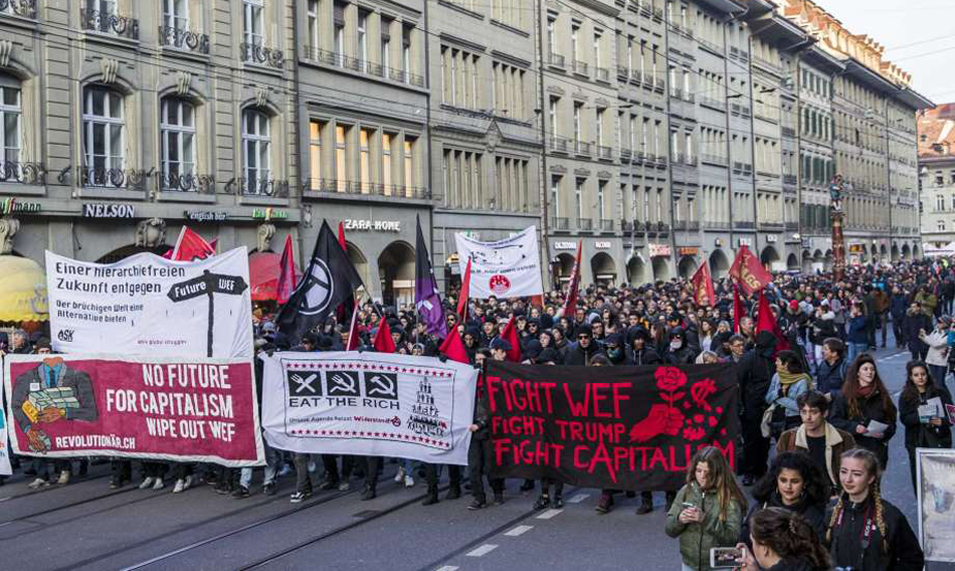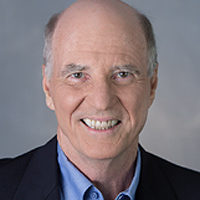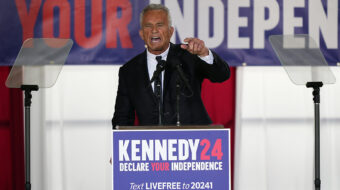
The global punditry is all a twitter this week with the prospect of Donald Trump going to Davos—the chic winter gathering place of the world’s rich and powerful.
The media narrative is that this will be a titanic clash of opposites. Populist, “America First” Trump confronting the high-minded capitalist builders of the global economy.
“It’s going to be a hell of a show,” a Vox writer assures us. “Fox in the Globalist Henhouse?” headlines the New York Times. The internationalist intellectual Niall Ferguson explains that: “Trump is as loathed by the elites of Western Europe as he is by the elites of Manhattan.”
No doubt many of Manhattan’s rich and powerful would agree with Trump’s Secretary of State (the former CEO of Exxon) that the president is a moron. But so what? Rather than drain the Washington swamp he pumped it even more full of Wall Street financiers, international business interests and lobbyists from virtually every sleazebag business interest in the country.
By now, it should be clear to anyone over the age of twelve that Donald Trump is neither an isolationist nor populist. He came into office with business interests in some 144 companies in 26 different countries, and has shamelessly used his presidency to expand them. Wherever he goes on a state visit, along goes Ivanka, Donald Jr., or Jared Kushner to leverage the visit into more business for the family.
Far from pulling America back from the world, he has enlarged its presence. He has placed the American military in even more countries, threatened others with destruction unless they give in to his petulant demands and called for budget cuts for programs here at home but budget increases for military activities abroad.
True enough—to placate his base—he has stopped Obama’s proposed Trans-Pacific Partnership and threatens to tear up NAFTA if he can’t get a better deal. But bully and bluster is the way he bargains—and keeps himself in the spotlight. Can anyone really believe Trump has a serious plan to reduce the U.S. trade deficit?
Michael Froman, U.S. Trade Representative under Obama, tells us that Trump in Davos “is like going into the belly of the beast and laying out his alternative vision of the world.”
An alternative vision? Perhaps a bit less refined and more obviously ego-saturated than that of your average European CEO, but Trump’s vision of the world is quite in sync with the Davos crowd—the world economy as a neoliberal dog-eat-dog jungle, where government’s role is to help the rich get richer.
In fact, Trump comes to Davos as its biggest benefactor in years. His massive tax cut to business and the wealthy will enrich the many foreign investors in U.S. companies, and it will bring pressure on other governments to cut corporate taxes in order to compete with the United States for investment.
Like Trump, Davos is all show. Exploiting the world’s fascination with wealth, it casts itself as a place for the compassionate rich to ponder the conditions of the world’s less fortunate. The speakers include a sprinkling of professors, movie stars discussing their favorite charities and ambitious NGO activists. Davos organizers even offer the corporate leaders who pay roughly $100,000 for Davos membership the opportunity to experience the life of a refugee—like Marie Antoinette playing milkmaid in the palace at Versailles.
The snowy climate outside Davos and the menu inside its lush dining rooms may be different from Trump’s Mar-a-Lago, but the political distance is nil. People go there to network in luxury and set up the deals that actually determine who gets what in this new world economic order.
So it’s no surprise that while Davos prospers the rest of the world struggles. Based on data from the World Bank, Credit Suisse and Forbes Magazine, a just-released report from Oxfam International shows that one percent of the world’s population received 81 percent of its income last year. Just 42 individuals now have more wealth than 3.7 billion people—one-half of the world’s entire population.
The report also notes that the wealth of two-thirds of the world’s billionaires is based on “inheritance, monopoly and cronyism.”
Not to worry, Donald. You’re among friends.
Jeff Faux is an economist at the Economic Policy Institute, the most important pro-labor think tank in the United States. The above article appeared in his blog and was emailed to subscribers and readers of EPI publications, including the Peoples World.












Comments